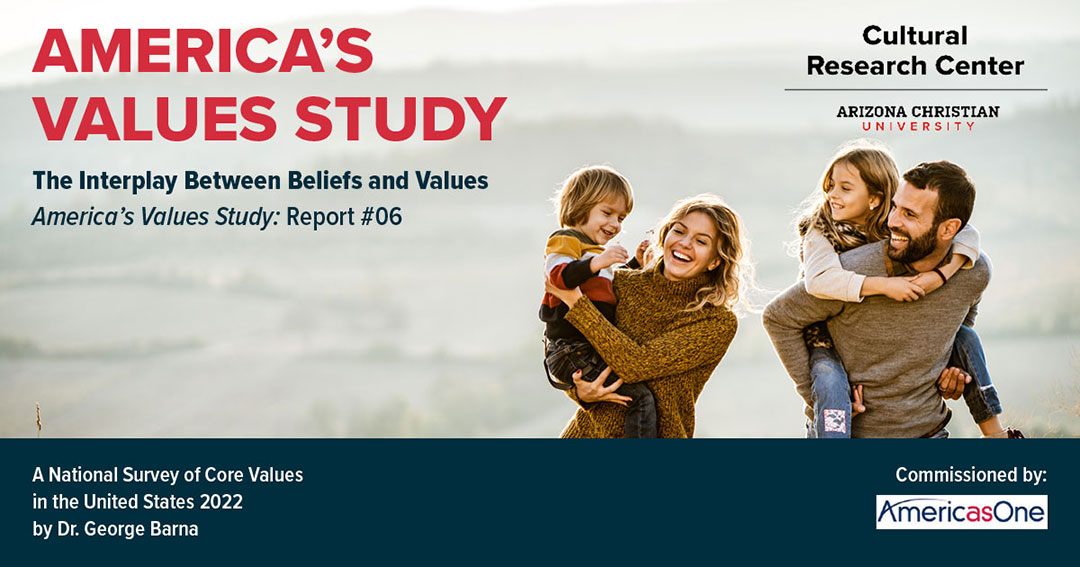Tracy F. Munsil | February 14, 2023 | America’s Values Study
From the Cultural Research Center at Arizona Christian University
A tremendous chasm exists between those who have a biblical worldview and those who don’t, and new research shows just how dramatically this worldview gap defines—and differentiates—our core values as Americans.
According to a new report from Dr. George Barna and the Cultural Research Center at Arizona Christian University, differing worldviews deeply divide Americans when it comes to what we say we would be willing to die to defend, fight to protect, or sacrifice precious resources to retain—in other words, what we identify as our “core values.”
The report demonstrates how our core values are dramatically shaped by worldview—from what we prioritize, to how we live our lives, and even how we understand what it means to be an American.
Most significantly, the report shows a significant erosion of the values that have historically been seen as essential elements of the American dream, regardless of one’s religious faith, social class, generation, or ethnic heritage. The report identified huge differences in values such as Christian faith, biblical morality, character, civic duty, humility, property ownership, hard work, religious freedom, simple lifestyle, financial thrift/caution, opportunity, individual growth, control, and happiness.
According to Barna, considering the values of people who are fundamentally secular in their view of the world (a group he defines as “World Citizens”) compared with those who hold a biblical worldview (“Integrated Disciples”), we uncover the roots of the deep divisions gripping America.
As Barna notes, “One could easily conclude that tens of millions of the nation’s World Citizens are redefining not just the American Dream, but even what it means to be an American citizen.”
“To Integrated Disciples, it is virtually inconceivable that every American would not assign great value to personal character, civic duty, humility, hard work, individual growth, and happiness—and yet, the analysis shows this is clearly the case,” Barna explained.
The findings also illustrate just how far-removed millions of American adults are from possessing a biblical worldview.
“This is a truly unique analysis of the interplay of beliefs and values,” according to ACU President Len Munsil. “We’re so divided as a nation, but this research gives us a rich understanding of what others value and why.”
Munsil continued, “It also shows where secular thinking has crept into the church, eroding fundamental American values. This research can guide efforts to strengthen these key areas of worldview understanding among believers.”
Another key finding shows that World Disciples (75% of American adults) are far more likely than Integrated Disciples to adopt 10 specific values:
- Economic equality (32 percentage point difference)
- Cultural diversity (32-point difference)
- Unrestrained choice (28-point difference)
- Unconstrained sex (26-point difference)
- Uncensored entertainment (26-point difference)
- Universal empowerment (25-point difference)
- Tolerance (15-point difference)
- Eliminating hierarchies (15-point difference)
- Belonging (14-point difference)
- Winning (12-point difference)
A closer look at those 10 values shows them to be the kinds of preferences that are most popular among political “progressives,” reflecting a preference for life without limitations or boundaries.
According to Barna, this distinctive group of values makes sense, given that the worldview of World Citizens is Syncretism, a mix of ideals drawn from a variety of life philosophies that place human beings, rather than God, at the center of reality; represent ways of life that reject absolute moral truths and traditional boundaries; and elevate the importance of personal freedom and happiness.
The report looks at the relationship between worldview and the values of Americans by integrating data and insights from two of CRC’s most substantial projects: the American Worldview Inventory, an annual survey of the worldview of American adults, and the America’s Values Study 2022, a comprehensive study of how Americans view 48 specific values. Earlier reports from those studies are available on the CRC website.
Other findings from the report include:
- People without a biblical worldview typically have only a handful of values they care deeply about. A majority of World Citizens claim just three core values—family, personal independence, and justice. On the other hand, Integrated Disciples embrace 30 values, including those three. Despite seeming consensus regarding that trio of values, worldview differences create deep disagreement over their definition.
- Integrated Disciples (6% of American adults) express deeper commitment to values associated with traditional aspects of personal goodness, such as character, citizenship, industriousness, and personal boundaries.
Despite the glaring discrepancies in values, Barna suggested that the findings in the report could spark national spiritual growth.
“Dialogue regarding core values could become a pathway to a deeper spiritual conversation about the source of our values and their influence on our behavior,” Barna explained. “Focusing on building relationships would enable the church to demonstrate biblical truths and share their core values rooted in those truths.”
The full report by George Barna, America’s Values Study: Report #06: “The Interplay Between Beliefs and Values'” is available here.
America’s Values Study: A National Survey of Core Values in the United States 2022 is based on two nationwide surveys commissioned on behalf of AmericasOne and conducted in July 2022 to identify key beliefs among American adults.

